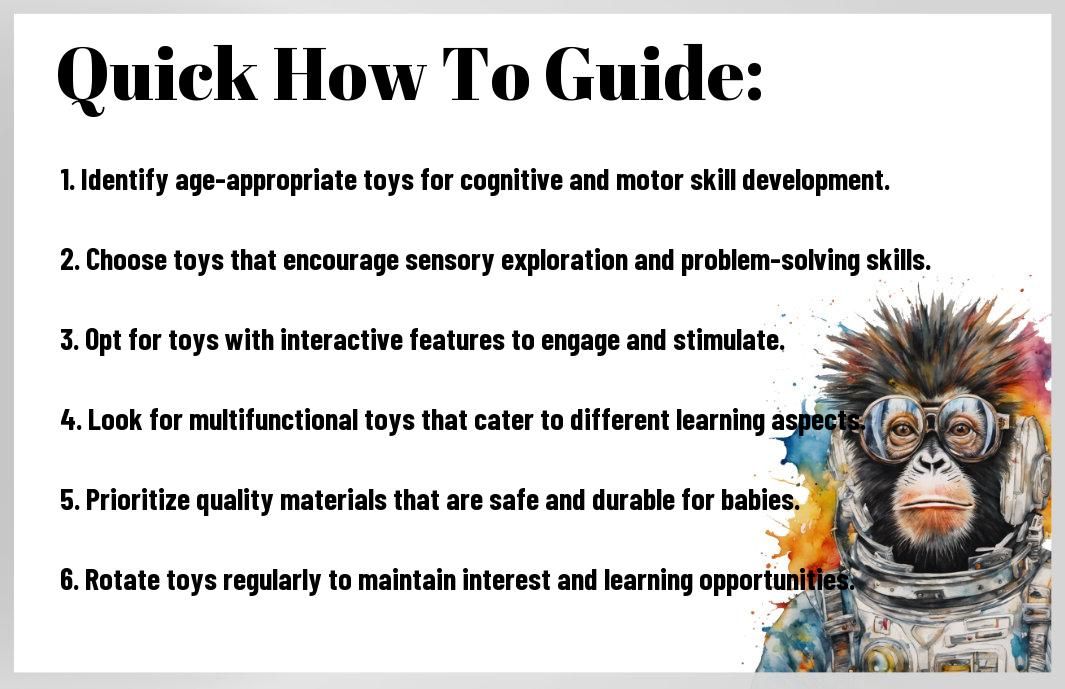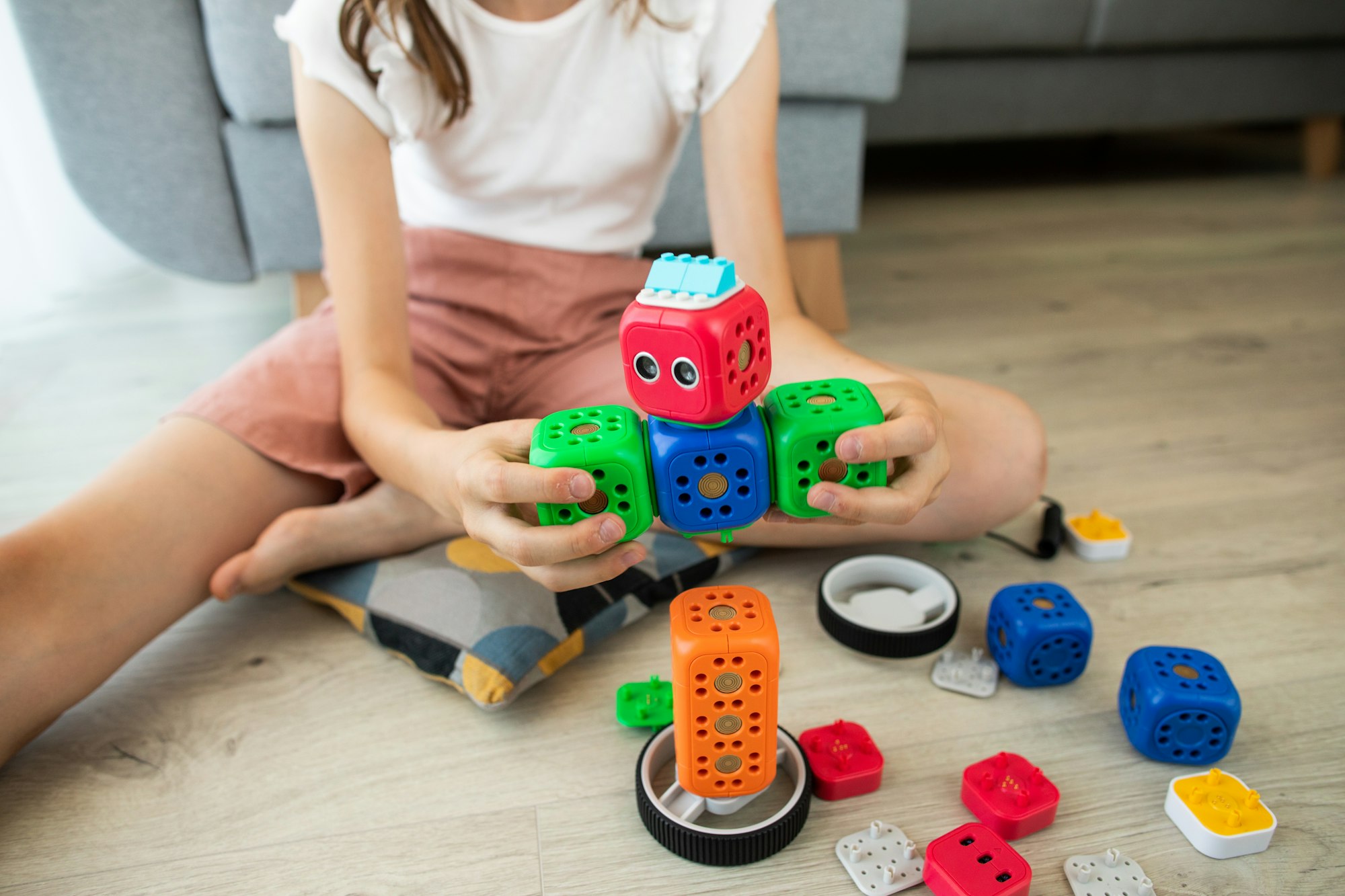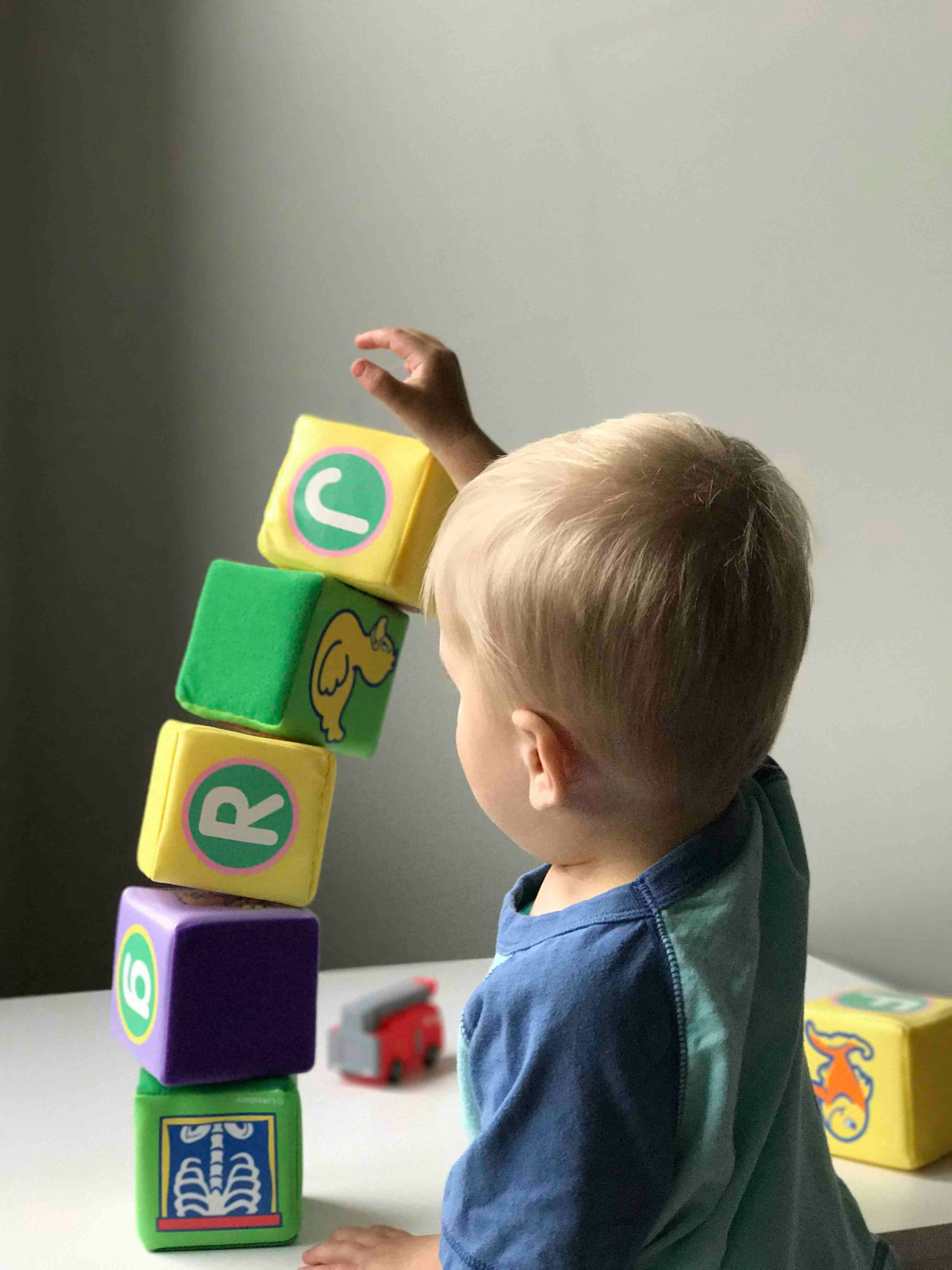Development of babies is crucial during their early years, and choosing the right educational toys can greatly impact their growth. In this guide, we will examine into innovative ways to select the best toys that foster early development. From considering a toy's sensory benefits to its cognitive stimulation, we will explore the key elements to keep in mind when choosing toys for your little one. Ensuring that the toys are both educational and developmentally appropriate is imperative for laying a strong foundation for your baby's growth and learning.
Key Takeaways:
- Consider multi-sensory toys: Opt for toys that stimulate different senses like touch, sight, and sound to promote cognitive development in babies.
- Choose age-appropriate toys: Select toys that are suitable for your baby's age and developmental stage to ensure they are both safe and beneficial for learning.
- Prioritize open-ended toys: Opt for toys that encourage imaginative play and creativity, allowing babies to explore and learn at their own pace.


Understanding Early Childhood Development
Now, let's research into the different aspects of early childhood development that are crucial for selecting the right educational baby toys. Understanding how children grow and learn is vital to cater to their needs effectively.
Cognitive Development Stages
On cognitive development, babies go through various stages that shape their understanding and thinking. From simple reflexes at birth to complex problem-solving skills in preschool years, each stage plays a vital role in their cognitive growth. Providing toys that encourage exploration, imagination, and problem-solving can help stimulate their cognitive development at every stage.
Physical and Motor Skill Development
Stages of physical and motor skill development in babies involve milestones like grasping objects, sitting up, crawling, and eventually walking. These physical advancements are crucial for their overall development and coordination.
Development in this area can be supported by offering toys that require different levels of physical manipulation and movement. Toys that promote reaching, grabbing, and holding can enhance their motor skills as they grow.
Little ones learn to control their movements and explore their surroundings through play. By engaging in activities that challenge their motor skills, they can improve coordination and balance.
Emotional and Social Development
Emotional and social development is another key aspect of early childhood growth. Babies start forming attachments, expressing emotions, and understanding social cues from a very young age. Building strong emotional bonds with caregivers and learning to interact with others are vital for their social development.
For instance, playing with toys that promote sharing, turn-taking, and communication can help foster their emotional intelligence and social skills. Encouraging positive interactions through play can have a lasting impact on their social development.
The Role of Educational Toys in Early Learning
Enhancing Sensory Experience
Sensory experiences play a crucial role in a baby's early development. Educational toys designed to enhance sensory experiences typically come in various textures, colors, and shapes. These toys help stimulate different senses such as touch, sight, and hearing, creating a rich sensory environment for the baby to explore. By engaging in sensory play with these toys, babies can develop their sensory processing skills and improve their overall sensory awareness.
Promoting Problem-Solving Skills
On the other hand, educational toys focused on promoting problem-solving skills are crucial for cognitive development. These toys often present challenges that require babies to think critically and figure out solutions. By engaging with problem-solving toys, babies learn how to analyze situations, strategize, and develop their problem-solving abilities. This early exposure to problem-solving can lay the foundation for strong critical thinking skills in the future.
To further enhance problem-solving skills, parents can introduce educational toys that progressively increase in complexity. Starting with simpler puzzles or shape-sorting toys and gradually moving on to more challenging games can help babies build on their problem-solving abilities over time.
Encouraging Imagination and Creativity
While sensory and problem-solving toys are crucial, encouraging imagination and creativity through educational toys is equally important. Toys that promote creativity often allow babies to engage in imaginative play, such as pretending to be a doctor or building a castle with blocks. These open-ended toys inspire creativity, foster imagination, and encourage self-expression in young children.
A diverse collection of educational toys that cater to different aspects of early learning is crucial for a well-rounded developmental experience. By providing a variety of toys that promote sensory exploration, problem-solving, and imaginative play, parents can create a stimulating environment that nurtures their baby's cognitive, emotional, and social growth.


How to Evaluate Educational Baby Toys
Safety Considerations
Your baby's safety is the top priority when choosing educational toys. Clearly, opt for toys that are BPA-free, non-toxic, and have no small parts that could be a choking hazard. Make sure there are no sharp edges or loose parts that could harm your little one. Always check for any potential safety recalls on the toys you are considering.
Material and Durability
One necessary factor to consider is the material and durability of the toy. For instance, look for toys made of high-quality, sturdy materials that can withstand rough play and frequent use. Choosing toys that are easy to clean and maintain will ensure they stay germ-free for your baby's health.
Age Appropriateness
Safety is crucial when evaluating the age appropriateness of educational baby toys. To prevent any accidents, select toys that are specifically designed for your child's age group. Make sure the toy is challenging enough to promote development but not too advanced that it becomes a safety risk.
Factors to Consider When Choosing Educational Baby Toys
Unlike regular baby toys, educational baby toys are specifically designed to stimulate a child's learning and development. When identifying the right educational toys for your baby, there are several key factors to consider to ensure they are both engaging and beneficial for your little one's growth.
Child’s Interest and Skill Level
Consider your child's individual interests and current skill level when choosing educational toys. Age-appropriate toys that align with your child's interests will likely hold their attention longer and encourage active engagement. Look for toys that can challenge your baby's developing skills but are not too advanced that they become frustrated. Customize the learning experience based on what interests and excites them the most to maximize the educational benefits.
Educational Value and Learning Goals
Level of educational value and alignment with learning goals should be a top priority when selecting educational baby toys. Opt for toys that promote cognitive development, sensory exploration, motor skills, and problem-solving abilities. Consider how the toy can help your child achieve important milestones in their early development, such as language skills, social interaction, and emotional awareness. The best educational toys are those that provide a variety of learning experiences and can adapt to your baby's changing needs over time.
Goals
Versatility and Ability to Grow with Your Child
Your child's development is a continuous journey, so it is important to choose educational toys that have versatility and the ability to grow with them. Look for toys that offer different ways to play and can adapt to your child's advancing skills as they grow older. Toys that can be used in multiple ways or have different levels of complexity will remain engaging and challenging for your child as they progress through different developmental stages.
Tips for Selecting the Best Educational Baby Toys
Many parents understand the importance of educational baby toys in stimulating their child's early development. However, with a plethora of options available in the market, choosing the right ones can be overwhelming. To help you make the best decisions for your little one, consider the following tips:
Reading Customer Reviews and Ratings
Even with the vast array of educational baby toys available, it can be challenging to discern which ones are truly effective. One way to navigate through this dilemma is by reading customer reviews and ratings. By learning about other parents' experiences with specific toys, you can gain valuable insights into their quality and effectiveness. Look for feedback on how the toys helped in developing various skills and whether they were durable enough to withstand a baby's play.
Innovative Educational Baby Toys on the Market
After thorough research and analysis, we have curated a list of innovative educational baby toys that are currently making a mark in the market. These toys are designed to not only entertain but also stimulate early development in infants and toddlers. From interactive plush toys to educational tech gadgets, there is a wide range of options available to cater to different learning styles and preferences.
Interactive Plush Toys
Toys such as interactive plush animals or characters are designed to engage babies through sensory experiences. These toys often feature different textures, sounds, and activities that help in the development of motor skills and hand-eye coordination. For example, a plush toy that plays music when squeezed can help babies learn about cause and effect while providing auditory stimulation.
Constructive Play Sets
Even at a young age, babies can benefit from constructive play sets that allow them to explore and build. These sets may include colorful blocks, stacking toys, or shape sorters that enhance cognitive skills and foster creativity. By manipulating and stacking blocks, babies can improve their hand dexterity and spatial awareness.
It is important to select constructive play sets that are made from safe, non-toxic materials to ensure the well-being of the child.
Musical Instruments for Early Development
Playful exposure to musical instruments can have a profound impact on a baby's sensory development. Toys such as mini pianos, drums, or xylophones can help babies explore different sounds and rhythms, contributing to their auditory discrimination skills. Additionally, engaging with musical instruments can promote emotional expression and creativity in infants.
Interactive musical instruments that respond to touch or movement can further enhance a baby's engagement and learning experience.
Educational Tech Gadgets
For instance, baby laptops or tablets designed for early learning can introduce babies to letters, numbers, shapes, and colors in a fun and interactive way. These gadgets often feature lights, sounds, and music to capture the attention of young learners. Additionally, some educational tech gadgets come with parental controls to ensure a safe and age-appropriate learning environment.
Clearly, when selecting educational tech gadgets, it is crucial to set limits on screen time and choose devices that offer educational content aligned with the child's developmental stage.
Making the Most Out of Educational Baby Toys
Integrating Play with Daily Routines
For optimal early development, it's crucial to integrate play activities with your baby's daily routines. Whether it's incorporating educational toys during mealtime, bath time, or bedtime rituals, the key is to make learning opportunities seamless and fun. Playing with toys that stimulate the senses can enhance cognitive development and create lasting associations with learning.

Tips for Engaging Your Baby During Playtime
Engaging your baby during playtime is not only enjoyable but also imperative for their growth. Make the most out of play sessions by focusing on interactive toys that encourage exploration and creativity. Some key tips include getting down to your baby's level, using a variety of toys to keep them interested, and talking to them to promote language development. Any interaction with your baby, even through play, is a valuable opportunity for bonding and learning.
- Get down to your baby's level
- Use a variety of toys
- Talk to your baby to promote language development. Any
Storing and Maintaining Toys for Longevity
One imperative aspect of ensuring the longevity of educational baby toys is proper storage and maintenance. Keeping toys organized and in good condition not only extends their lifespan but also ensures that they remain safe for your baby to play with. Implementing a storage system that allows easy access to toys while keeping them out of harm's way can make playtime even more enjoyable for both you and your little one.
With regular cleaning and inspection, you can prevent any potential hazards such as broken pieces or loose parts that could pose a danger to your baby. Additionally, storing toys in a clean and dry environment can help prevent germs and bacteria from accumulating, promoting a safe and healthy play space for your child.
To wrap up
Drawing together all the innovative ways on how to choose educational baby toys for early development, it is clear that parents have a variety of options to consider when selecting toys that promote learning and growth in their little ones. By focusing on toys that stimulate the senses, encourage problem-solving, promote physical activity, and offer opportunities for social interaction, parents can help support their child's cognitive, physical, and emotional development in a fun and engaging way.
When choosing educational baby toys, it is important to prioritize safety, quality, and age-appropriateness to ensure that the toys will provide maximum benefit to the child. By being intentional and thoughtful in selecting toys that align with a child's developmental stage and interests, parents can create a nurturing environment that fosters curiosity, creativity, and a love for learning from an early age.
FAQ
Q: Why is it important to choose educational baby toys for early development?
A: Choosing educational baby toys for early development is crucial as it helps in stimulating cognitive, sensory, and motor skills in infants. These toys play a significant role in enhancing their learning abilities and fostering overall development.
Q: How can I determine if a baby toy is educational?
A: Look for toys that are age-appropriate, safe, and offer sensory stimulation such as different textures, colors, and sounds. Educational toys should also encourage problem-solving, creativity, and interaction, rather than passive entertainment.
Q: What are some innovative ways to choose educational baby toys?
A: Consider toys that promote exploration and experimentation, such as building blocks, shape sorters, and activity mats. Opt for toys that grow with the child, offer multi-sensory experiences, and are made from safe, non-toxic materials. Additionally, seek recommendations from child development experts or other parents to find the most beneficial toys for early development.


